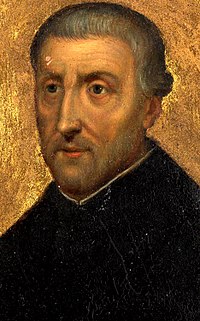St. Peter Canisius was born in the Netherlands in 1521. His father was a wealthy public official, and his mother died soon after his birth. Peter studied at Cologne around the age of 15, and earned his master’s degree before he was 20. Over the course of his studies, Peter made many Catholic friends, even as the Protestant doctrines were growing in popularity in Germany.
Despite pressure to marry from his father, Peter decided in 1540 to remain celibate. He entered the Society of Jesus three years later, influenced by Blessed Peter Faber, one of the first companions of St. Ignatius Loyola. He became a priest in 1546, and was involved in the successful efforts to oust Cologne’s Archbishop, Hermann of Wied, after the archbishop began to align with Protestant teachings.
The year after his ordination. Peter accompanied the Bishop of Augsburg to the Council of Trent, serving as a theological advisor. He worked directly under St. Ignatius while in Italy, and then went to Bavaria to teach at the university and preach the Gospel. In 1552, he went to Vienna to do the same, assisting many of the Austrian parishes that lacked priests.
In the mid-1550s, Peter traveled to Prague, where he founded a Jesuit school. He founded another in Bavaria, and a third in Munich. In 1555, St. Ignatius promoted Peter to a leadership positions within the Jesuits, which he held until 1569. During that time he published the first and longest version of his Catechism, which (along with two shorter adaptations) were used for centuries.
Over the next several years, Peter continued to defend Catholicism against Protestants, and kept up a commitment to religious instruction, teaching children, giving retreats, and preaching to large crowds. His efforts were a major factor in the revival of German Catholicism, and he did similar work in Switzerland.
In 1584, Peter had a mystical experience that convinced him to stay in Switzerland. He continued to preach and write there, suffering a near-fatal stroke in 1591, only to recover and continue to write for the next six years. St. Peter died on Dec. 21, 1597.
Pope Pius XI simultaneously canonized St. Peter and declared him a Doctor of the Church in 1925.
Start your day with Always Forward, our award-winning e-newsletter. Get this smart, handpicked selection of the day’s top news, analysis, and opinion, delivered to your inbox. Sign up absolutely free today!

